
The winners of the Central Banking Awards 2016
Central Bank of Ireland, Erdem Başçı, Zeti Akhtar Aziz among winners

Full list of winners:
Central Bank of the Year: Central Bank of Ireland
Governor of the Year: Erdem Başçı
Lifetime Achievement Award: Zeti Akhtar Aziz
Economics in Central Banking Award: John Taylor
Reserve Manager of the Year: National Bank of Denmark
Transparency Award: Bank of Israel
Initiative of the Year: Reserve Bank of New Zealand
Website of the Year: European Central Bank
Sovereign Investor of the Year: Future Fund
Asset Manager of the Year: State Street Global Advisors
Global Custodian of the Year: Northern Trust
Foreign Exchange Dealer of the Year: HSBC
Consultancy and Advisory Services Provider of the Year: BlackRock Solutions
Risk Management Services Provider of the Year: Wall Street Systems
Banknote and Currency Services Provider of the Year: Leonhard Kurz Stiftung & Co
Technology Provider of the Year: BearingPoint
Payments Provider of the Year: Intellect Design Arena
Market Infrastructure Provider of the Year: LCH.Clearnet
The Central Bank of Ireland and Erdem Başçı are among the big winners in the Central Banking Awards for 2016, and were today (January 14) named Central Bank of the Year and Governor of the Year respectively.
Başçı, governor of the Central Bank of the Republic of Turkey, was one of three individuals honoured, with Zeti Akhtar Aziz winning the Lifetime Achievement Award, after more than a decade-and-a-half leading Bank Negara Malaysia. John Taylor, meanwhile, was handed the Economics in Central Banking Award for his work published in 2015 on the creation of global 'rules of the game' for monetary policy.
The other official institutions recognised were the National Bank of Denmark (Reserve Manager of the Year), the Bank of Israel (Transparency Award), the Reserve Bank of New Zealand (Initiative of the Year), the European Central Bank (Website of the Year) and the Future Fund (Sovereign Investor of the Year).
As part of "recognising excellence in the central banking community", the publication also honours services providers and partners who contribute to "furthering good practice within the profession".
Among these market practitioners, State Street Global Advisors was named Asset Manager of the Year, HSBC Foreign Exchange Dealer of the Year, and BlackRock Solutions Consultancy and Advisory Services Provider of the Year.
The other winners were Wall Street Systems (Risk Management Services Provider of the Year), Leonhard Kurz Stiftung & Co (Banknote and Currency Services Provider of the Year), BearingPoint (Technology Provider of the Year), Intellect Design Arena (Payments Provider of the Year), Northern Trust (Global Custodian of the Year) and LCH.Clearnet (Market Infrastructure Provider of the Year).
Ireland's emergence
The judging panel, comprising members of Central Banking editorial staff and former senior central bankers sitting on the publication's advisory board, highlighted the introduction of residential mortgage lending rules in Ireland.
Noting these actions helped to curb property prices and price expectations in 2015, the judges said the move demonstrated the Central Bank of Ireland's resolve to tackle sensitive issues in an independent manner.
Both Philip Lane, the Irish governor, and Başçı, the Turkish governor, pointed to the expansion of their toolkits for addressing financial stability as key developments in the period under review.
"Now that we have the appropriate toolkit in place to protect financial stability, I believe the willingness of the central bank to intervene in a structural and proportionate manner is evident and clearly demonstrates the bank has undergone a transformation since the financial crisis", said Lane, commenting on the award.
Looking ahead, the governor cited the importance of Ireland building up financial and fiscal buffers to guard against future shocks. Looking forward to the prospect of a European recovery, he said he supported the continuing efforts of the European Central Bank's governing council to deploy non-standard measures in fulfilling its price stability mandate.
Looking beyond the euro area, he said that "developments in emerging economies should be monitored closely, given their importance in determining global output and their growing impact on the global financial system".
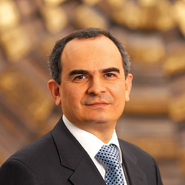 Erdem Başçı, Central Bank of the Republic of Turkey
Erdem Başçı, Central Bank of the Republic of Turkey
Başçı's big year
Başçı has guided the Central Bank of the Republic of Turkey though a turbulent period marked by policy spillovers from advanced economies, political interference at home and conflict in the Middle East. He was heavily involved in work related to Turkey's presidency of the G-20 and has placed a keen focus on reviwing corporate funding. He has adopted an innovative approach to curbing inflation expectations in Turkey while also planning ahead for a normalisation of interest rates in the US.
Başçı himself pointed to the Turkish central bank's broader toolkit for addressing financial imbalances: "Our external and internal imbalances have been reduced significantly and thereby a more balanced growth performance was achieved in [the] year 2015. Developing and utilising a rich set of macro-prudential tools in addition to prudent monetary and fiscal policies have been instrumental behind this performance, in a challenging global environment."
Zeti's lifetime achievements
Zeti Akhtar Aziz is a 30-year veteran of the Bank Negara Malaysia, leading the central bank since 2000. She played a crucial role in addressing the Asian financial crisis in the late 1990s, and has led the charge on Islamic finance and financial inclusion in her country and beyond.
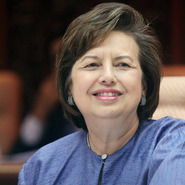 Zeti Akhtar Aziz, Bank Negara Malaysia
Zeti Akhtar Aziz, Bank Negara Malaysia
Christopher Jeffery, chairman of the Central Banking Awards Committee and editor-in-chief of Central Banking, highlighted her introduction of exchange controls at the height of the Asian crisis, noting the opposition from both official and private institutions. "History looks set to judge her more favourably than her critics and, over time, the IMF has moved closer to Zeti's way of thinking," he said. Zeti, Jeffery added, was "the leading role model for middle income country central banks".
Zeti said she was "truly honoured" to receive the award. She follows in the footsteps of Jacques de Larosière and Paul Volcker, who collected the award in 2015 and 2014 respectively. "These recent three decades have seen central banks at the forefront in the management of a more highly challenging economic and financial environment. Our accountability is immense," Zeti said, accepting the award. "It has been my privilege to be part of the central banking community to deliver the best outcomes for our respective jurisdictions in what has become a more interdependent world."
Looking ahead, Zeti noted a "major challenge" for central bankers will be "maintaining an effective interface with the government and other public institutions when it comes to restoring financial stability and growth - while at the same time preserving the autonomy and independence of the central bank".
As with Lane and Başçı, Zeti noted the greater role for central banks in maintaining financial stability. When it comes to exercising their new powers, she said, ensuring "greater transparency and greater clarity" will help "avoid confusion and allow central banks [to] perform their financial stability mandate unhindered".
"This will be essential of central banks are to utilise these new financial stability powers that have now been accorded to them effectively," she said.
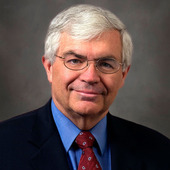 John Taylor, Stanford University
John Taylor, Stanford University
John Taylor rules
Stanford professor of economics John Taylor's work continues to inform and provoke debate in the central banking community. His 2015 paper, A rules-based cooperatively-managed international monetary system for the future, considered how to establish global 'rules of the game' for monetary policy.
His solution, which allows central banks the flexibility to follow their domestic mandate, avoiding a mechanistic reliance on rules, impressed the judges, who considered the paper an important addition to the debate.
"In a world of unorthodox and divergent monetary policy among major central banks, establishing international 'rules of the game' to minimise unnecessary policy spillovers and spillbacks is a laudable aim," Jeffery said. "John Taylor is a leading proponent in this effort."
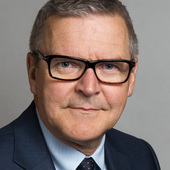 Lars Rohde, National Bank of Denmark
Lars Rohde, National Bank of Denmark
Official successes
Commenting on the award for Reserve Manager of the Year, handed to the National Bank of Denmark, governor Lars Rohde pointed to the "massive" inflows and outflows experienced by the country in the 2015.
This, he said, highlighted "the importance of effective and robust risk management and prudent liquidity management in particular". The central bank overhauled its reserves management approach in the year under review, implementing a risk budget-based investment strategy, which withstood first a strong flow of funds into Denmark, testing the krone's peg to the euro, and later a strong flow out.
"The challenging environment for reserve managers will likely persist," Rohde added. "We continuously seek to improve our framework and look forward to the continued exchange of ideas and experience with our reserve management colleagues around the world."
The Bank of Israel was handed the Transparency Award for 2016 after taking multiple steps to improve its already strong communications. This included introducing press conferences after monetary policy decisions, publishing a host of new documents in the area of financial stability and introducing forward guidance.
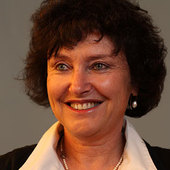 Karnit Flug, Bank of Israel
Karnit Flug, Bank of Israel
"Communication of monetary policy is an ever-growing challenge, especially as monetary policy is exploring new frontiers," governor Karnit Flug said, commenting on the award. Looking forward, the central bank is aiming to increase staff interaction with the public in the coming years, but how far to go remains an open question.
"For the Bank of Israel, which is also in charge of bank supervision, economic advice to the government and other duties, the issue of the limits of transparency is an ongoing dilemma," she added.
One of three new categories for 2016, the award for Initiative of the Year went to the Reserve Bank of New Zealand (RBNZ), which judges felt had taken steps to implement a best-practice example of enterprise risk management (ERM).
Building on its good work in other fields, which saw it named Central Bank of the Year in 2015, the RBNZ's ERM project has succeeded in establishing a sounds risk culture throughout the organisation, and helped deliver other key strands of work including an overhaul of its real-time gross settlement system, a new banknote series and an upgrade to treasury risk management.
 Graeme Wheeler, RBNZ
Graeme Wheeler, RBNZ
"We feel confident that ERM is embedded as an integral part of our future success, not just in a major project capacity, but in the way managers think about enterprise risk across the institution," RBNZ governor Graeme Wheeler said. "Because ERM is seen as a critical component of the bank's business operations, it will continue to grow within and across the business."
The European Central Bank (ECB) was chosen as Website of the Year – arguably a misnomer, as staff developed not one but two new sites in the year under review; one for the ECB, another for its banking supervision arm.
Both websites feature streamlined homepages that allow their users to navigate smoothly through a range of content types and formats. Deeper into the sites, information is broken down intuitively, helping the user find what they need faster and more efficiently.

"Communication is at the heart of today's central banking," Mario Draghi, the ECB president said. "The website is our main tool to explain monetary policy and banking supervision to European citizens and specialised audiences in a timely and accessible way as we strive for transparency and accountability."
Australia's Future Fund picked up Sovereign Investor of the Year after recording a return of 15.4% last year, taking its annual average to 8% in the nine years it has existed. The judges picked out its efforts to improve its already flexible decision-making structure to pursue new investment opportunities, often in non-public markets – for example, transforming 'non-core' assets into 'core' assets in the property and infrastructure areas. The Melbourne-based fund also worked its portfolio "hard" in the past year, completing 50 transactions with a net sale of A$14.5 billion ($10.2 billion) in assets.
 David Neal, Future Fund
David Neal, Future Fund
While the global economy has "continued to heal" following the crisis, David Neal, Future Fund managing director, said "significant imbalances persist" and "the potential for missteps and shocks remain". Indeed, "we generally see prospective returns to investors being lower than in recent years", Neal warned.
Jeffery said: "The fund's management realises the old approaches will not bring high yields in the environment it now confronts. Instead, it is asking what it has to do to change, and is then acting on the answers. In this sense, it is a role model for other sovereign funds around the world grappling with similar problems."
Dealing with uncertainty
State Street Global Advisors (SSGA) serves 83 official institution clients, and managed $362 billion of their money as of September 2015. It was named Asset Manager of the Year for 2016 for helping those clients "navigate an uncertain, often troubled policy and market environment" in the past year, Jeffery noted.
The official institutions group of the firm, led by Louis de Montpellier, goes beyond managing assets under the contracts it has won, the judges noted, as it also assists with developing the capacities of official institutions.
Ron O'Hanley, president and CEO of SSGA, said the company's investment teams "have developed a wide array of tools and solutions that can be adapted to assist any central bank realise its distinctive financial objectives, from reserve management to policy implementation".
He added its services to the central bank community extend beyond pure investment activities to "broader thought leadership contributions as well as skill transfers in many related fields".
An upgrade in its reporting systems earned Northern Trust the award for Global Custodian of the Year, while the Chicago-based company also built up its strategic relationships in some newly emerging financial hubs and deepened its service offering in a number of emerging countries, the judges noted.
Penelope Biggs, head of Northern Trust's Institutional Investor Group, Europe, Middle East and Africa, said sovereign entities "continuing to focus on increased transparency, governance and risk management" need "increasingly sophisticated tools and customised services as they expand their investment horizons".
Northern Trust, Biggs said, provides "innovative solutions to support the unique requirements of sovereign entities" and sees "increasing demand for our global technology capabilities, consultative approach and advanced governance solutions, particularly in Africa and Asia".
Foreign Exchange Dealer of the Year HSBC was a key partner for central banks looking to make sense of the liberalisation of China's financial markets in the period under review, the panel noted. It also helped clients rebalance their euro exposures and manage their moves into and out of higher yielding currencies. In the course of its work it met with over 50 central banks last year.
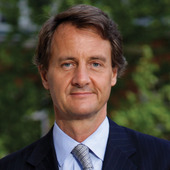 Christian Deseglise, HSBC
Christian Deseglise, HSBC
"2016 will be another eventful year, with exciting developments such as the addition of the renminbi to the SDR basket representing a big evolution for reserve managers," Christian Deseglise, global head of central banks, sovereign wealth and public funds financial institutions group, HSBC, said.
BlackRock Solutions was named Consultancy and Advisory Services Provider of the Year, with the panel noting the firm is particularly strong in mapping out large numbers of different assets across multiple markets.
This, the judges said, included complex and illiquid instruments that require substantial modelling and processing power. BlackRock Solutions utilises large amounts of data in adopting a 'bottom-up' approach to its work, complementing 'top-down' assessments.
Rob Goldstein, chief operating officer of BlackRock, and global head of BlackRock Solutions, said the firm was "privileged to serve central banks, finance ministries, multilateral institutions, public pension plans and other official institutions across a wide and growing range of assignments".

"BlackRock especially appreciates the affirmation this award brings to our Aladdin and financial markets advisory businesses," he added. Through its financial markets advisory, Aladdin risk analytics and client solutions units, Christopher Jeffery said BlackRock Solutions "appears unrivalled in its ability to deliver advisory services to official institution clients".
Top technology
Wall Street Systems was named Risk Management Services Provider of the Year. Its platform, which supports central bank reserve management, monetary policy execution and banking services from front office to the back, won high praise from its clients, the panel said.
Judges highlighted its broad range of risk management tools, and the function displaying risks in real-time. Mike Saich, CEO government, stressed the "long-term relationships" between Wall Street Systems and its clients.
"We are looking forward to continued success with our existing clients and to adding more central banking clients in 2016," he said, helping them achieve "enduring improvements in workflow, control, transaction cost reduction", among other work strands.
The Banknote and Currency Services Provider of the Year for 2016 is Leonhard Kurz Stiftung & Co.
 Walter Kurz, Leonhard Kurz Stiftung & Co
Walter Kurz, Leonhard Kurz Stiftung & Co
The company has worked on more than nine new banknote denominations in seven different countries in the past year, attracting praise from its central banking partners. It has striven to integrate its features in both cotton and polymer substrates across the globe. Walter Kurz, CEO, said the company was "grateful" to its customers for "a friendly, open and collaborative exchange" on banknote security.
"Many of the innovations we have brought to market over the past months and years have been developed and industrialised in close collaboration with the central banks," he said. "This co-operation is essential in a world where criminals who aim to attack both governments and individuals by putting fake banknotes into circulation do not stand still in their efforts to hijack banknote security in pursuit of their crimes."
BearingPoint was recognised as Technology Provider of the Year after judges were impressed by its method for dealing with the growing quantities of data central banks handle, particularly for regulatory purposes.
Judges noted how the Abacus/Regulator platform allows central banks to collect, process, analyse and remit data all in one system, while clients pointed to BearingPoint's willingness to adapt its platform.
"Dealing with large amounts of data requires the right approach to information strategy, information management capabilities and technology itself," Robert Wagner, financial services leader at BearingPoint, said.
"For us the regulatory value chain spans across what many central banks would address as the market infrastructure. With our Abacus solution, we successfully implement regulatory frameworks working closely with our central banking customers."
Intellect Design Arena was named Payments Provider of the Year. Its platform provides the overarching infrastructure for the mass financial inclusion scheme being implemented by the Indian government – a huge project.
What began as a small-scale initiative with the Reserve Bank of India has morphed into a nationwide system, which ultimately may be scaled up to handle around 100 million payments a day.
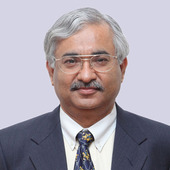 Jaideep Billa, Intellect
Jaideep Billa, Intellect
"We at Intellect understand and acknowledge the progressive vision of leading central banks in the world. We work towards addressing the bank's challenge to get over the investment hurdle and delivery risk to achieve operational excellence and deliver customer value," Jaideep Billa, the CEO of global consumer banking at Intellect Design Arena, said.
The Market Infrastructure Provider of the Year was LCH.Clearnet, with judges pointing to its crucial role in driving compression in the market for over-the-counter derivatives. In the year under review its innovative techniques, such as blended rate compression, helped drive down notional for its clients.
Beyond interest rate swaps, the central counterparty became the first CCP to offer inflation swaps clearing to its members and their clients, in the period under review.
"This award cements LCH.Clearnet's position as a trusted leader in clearing and risk management and recognises our efforts to bring greater efficiencies to the market," said Suneel Bakhshi, chief executive of LCH.Clearnet Group.
"We are committed in working in partnership with our customers, trading venues and regulators, and will continue to deliver innovative solutions and foster greater access to clearing in 2016."
The Central Banking awards were written by Christopher Jeffery, Tristan Carlyle, Daniel Hinge, Arvid Ahlund, Dan Hardie and Rachael King.
Only users who have a paid subscription or are part of a corporate subscription are able to print or copy content.
To access these options, along with all other subscription benefits, please contact info@centralbanking.com or view our subscription options here: www.centralbanking.com/subscriptions
You are currently unable to print this content. Please contact info@centralbanking.com to find out more.
You are currently unable to copy this content. Please contact info@centralbanking.com to find out more.
Copyright Infopro Digital Limited. All rights reserved.
As outlined in our terms and conditions, https://www.infopro-digital.com/terms-and-conditions/subscriptions/ (point 2.4), printing is limited to a single copy.
If you would like to purchase additional rights please email info@centralbanking.com
Copyright Infopro Digital Limited. All rights reserved.
You may share this content using our article tools. As outlined in our terms and conditions, https://www.infopro-digital.com/terms-and-conditions/subscriptions/ (clause 2.4), an Authorised User may only make one copy of the materials for their own personal use. You must also comply with the restrictions in clause 2.5.
If you would like to purchase additional rights please email info@centralbanking.com




